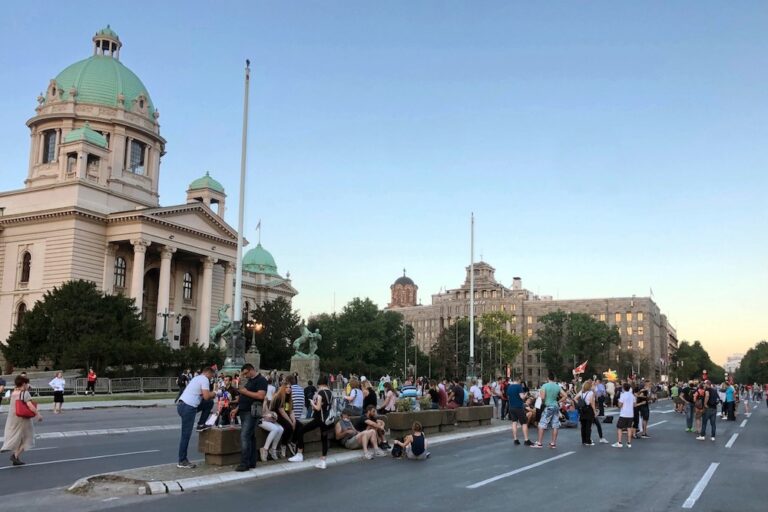(ARTICLE 19/IFEX) – The following is a 22 October 2003 joint letter by ARTICLE 19 and the Montenegrin Helsinki Committee, addressed to Milo Djukanovic, prime minister of the Republic of Montenegro: Mr Milo Djukanovic Prime Minister of the Republic of Montenegro By Fax: ++ 381 81 242 329 22nd October 2003 Dear Prime Minister, We […]
(ARTICLE 19/IFEX) – The following is a 22 October 2003 joint letter by ARTICLE 19 and the Montenegrin Helsinki Committee, addressed to Milo Djukanovic, prime minister of the Republic of Montenegro:
Mr Milo Djukanovic
Prime Minister of the Republic of Montenegro
By Fax: ++ 381 81 242 329
22nd October 2003
Dear Prime Minister,
We are writing with regard to the government’s commitment to reform the defamation provisions in the Criminal Code to bring Montenegro’s legislation into line with international standards. We urge you to use your influence to further the discussions in the working group established by the Ministry of Justice to reform the Criminal Code. In so doing, we draw your attention to the conclusions of the Regional Conference on Defamation and Freedom of Expression, hosted by the Council of Europe, in Strasbourg, in October 2002 (1); and reiterate the recommendations that were made by the participants at the seminar on defamation in Montenegro, funded by the German government and hosted by ARTICLE 19 and the Montenegrin Helsinki Committee, on 1-2 May, 2003 (2).
We are aware of the concerns which have been expressed about the consequences of decriminalising defamation, particularly in relation to the problem of hate speech in some sections of the Montenegrin media. However, we emphasise that while hate speech should be a criminal offence, it is not the purpose of defamation laws to deal with this issue. Hate speech and unwarranted invasion of privacy are issues which must be regulated by other laws. The sole purpose of defamation laws is to establish a balance between freedom of expression and the individual right to reputation.
We would like to remind you that support for decriminalisation of defamation has been demonstrated by key members of the Montenegrin executive and legislative authorities. On 30 April 2003, representatives of ARTICLE 19 and the Montenegrin Helsinki Committee met with Mr Rifat Rastoder, the vice speaker of Parliament who expressed his explicit support for the removal of defamation from the Criminal Code. At a further meeting with vice premier, Dragan Djurovic, our representatives also received assurances that the government would seek to incorporate international standards into the proposals for reform and in particular would propose the abolition of prison sentences and a maximum limit for fines.
Unfortunately, we understand that the initial discussions in the working group in relation to Chapter 17 “Criminal acts against honour and reputation”, Articles 193 – 201 (inclusive) have been disappointing.
First, we are extremely concerned by the retention of the provision of a three year prison sentence for conviction under Articles 194 (defamation), 196 (violation of the Union and the member states) and 198 (violation of the reputation of a foreign country or international organisation). Imprisoning individuals for defamation is in clear breach of international standards and the chilling effect exerted by the threat of imprisonment on the development of a free and independent media, which is essential to the development of a mature democratic society, can not be overstated. We recall the unanimous recommendation from the Council of Europe Conference that, “if public authorities decide to maintain criminal sanctions, there should be no imprisonment for defamation, a moratorium should immediately be applied where such sentences have already been handed down by national courts and financial penalties should be proportionate”.
Second, we regret the retention of Articles 196 and 198 which seek to protect the reputation of the Montenegrin state and national symbols and the reputation of foreign countries and international organisations. Objects such as national symbols do not have a reputation to protect and laws which provide for their protection are in breach of international standards as the restriction on freedom of expression is not in pursuit of a legitimate aim (3). Furthermore the use of defamation laws to protect relations with other countries can not be justified, since such laws are not narrowly designed to protect these interests and therefore are not necessary in a democratic society (4).
Third, we would like to stress the importance of establishing clear limits to the fines which can be imposed on defendants found guilty of defamation. The imposition of high fines can be as crippling to the functioning of a free press as custodial sentences.
Recent court judgements in defamation cases brought in Montenegro – such as the sentencing of Vladislav Asanin (Subotic vs. Asanin) to three months in prison – have shown that the judiciary does not apply the standards elaborated by the case law of the European Court of Human Rights in defamation cases, as penal sanctions and disproportionately high fines are regularly resorted to. In this situation, removal of the offence of defamation from the Penal Code is the only way of ensuring genuine respect for freedom of expression.
We urge you to take into account our recommendations in the further elaboration of reforms to the Criminal Code and remain available to discuss these issues further and provide additional advice at your request.
Yours sincerely,
Luitgard Hammerer
Europe Programme Director, ARTICLE 19
Tel: +44 207 2789292
Fax: 207 7131356
E-mail: Luitgard@article19.org
Slobodan Franovic
President, MHC
Tel/fax: +381 864 53 191
GSM: +381 (0) 690 53 191
E-mail: montheco@cg.yu
CC: President of the Republic of Montenegro, Mr Filip Vujanovic
President of the Supreme Court, Mr Stevan Damjanovic
President of the Constitutional Court, Radoje Korac
Speaker of the Montenegrin Parliament, Mr Ranko Krivokapic
Minister of Justice, Mr Zeljko Sturanovic
Council of Europe
OSCE Mission to Serbia and Montenegro
European Commission, Head of Unit for Western Balkans, DG External Relations
1. See, Conclusions of Regional Conference on Defamation and Freedom of Expression, Strasbourg, Council of Europe, October 17-18, 2002 www.humanrights.coe.int/media/events/2002/Conclusions%20Defamation.htm
2. See, Declaration of the Conference on Defamation in Montenegro, hosted by ARTICLE 19 and the Montenegrin Helsinki Committee, May 1-2, 2003.
3. See, Principle 2 (b) of Defining Defamation, ARTICLE 19’s Principles on Freedom of Expression and Protection of Reputation.
4 See, Principle 1 (c) as above.


